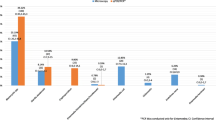Abstract
Intestinal parasitic infections are a global health problem that causes morbidity and mortality, especially in children living in rural areas. In this study, stool samples of pediatric patients with gastrointestinal complaints were examined by conventional and molecular methods to determine the prevalence of intestinal parasites. A total of 100 pediatric patients with gastrointestinal complaints and 50 healthy children were included in the study. Stool samples were collected from each child and examined by direct microscopic examination (native-Lugol method), formol-ethyl acetate concentration technique, Kinyoun’s acid-fast staining, and Wheatley trichrome staining methods. Real-time PCR was used for the detection of Blastocystis spp. and D. fragilis in the stool samples. Sanger sequencing was used to identify Blastocystis spp. subtypes. One or more intestinal parasites were found in 12% (n = 100) of the patient group and 1% (n = 50) of the control group using conventional techniques. By using real-time PCR, Blastocystis spp. was discovered in 14% (14/100) of the patient group and 8% (4/50) of the control group. There was no significant difference in the frequency of Blastocystis spp. between the two groups. The most prevalent Blastocystis subtype was ST1 and the most frequent allele was a2 among the samples successfully amplified and sequenced. D. fragilis was detected in 17% (17/100) of the patient group and 8% (4/50) of the control group by real-time PCR. The prevalence of D. fragilis was not significantly different between the patient and control groups, as well. Blastocystis spp. and D. fragilis were found in high prevalence in pediatric patients with gastrointestinal complaints in this study. Although the role of these protists as a pathogen in humans is still controversial, it is supposed to the presence of the parasites are associated with gastrointestinal disorders such as diarrhea, abdominal pain, nausea, and vomiting. More case-control studies are needed to understand the pathogenic or commensal role of these parasites on the intestinal microbiota, especially in both patients with gastrointestinal disorders and healthy individuals.
Similar content being viewed by others
Data availability
Not applicable.
References
Abu A, Sutthikornchai C, Mahittikorn A, Koompapong K, Chiabchalard R, Arthan D, Soonthornworasiri N, Popruk S (2022) Prevalence and Subtype Distribution of Blastocystis Isolated from School-Aged Children in the Thai-Myanmar Border, Ratchaburi Province, Thailand. Int J Environ Res Public Health 20:204. https://doi.org/10.3390/ijerph2001020442
Aykur M, Calıskan Kurt C, Dirim Erdogan D, Biray Avcı C, Vardar R, Aydemir S, Girginkardeşler N, Gündüz C, Dagci H (2019) Investigation of Dientamoeba fragilis Prevalence and Evaluation of Sociodemographic and Clinical Features in Patients with Gastrointestinal Symptoms. Acta Parasitol 64:162–170. https://doi.org/10.2478/s11686-018-00017-5
Brands MR, Van de Vijver E, Haisma SM, Heida A, van Rheenen PF (2019) No association between abdominal pain and Dientamoeba in Dutch and Belgian children. Arch Dis Child 104:686–689. https://doi.org/10.1136/archdischild-2018-316383
Clark CG, van der Giezen M, Alfellani MA, Stensvold CR (2013) Recent developments in Blastocystis research. Adv Parasitol 82:1–32. https://doi.org/10.1016/B978-0-12-407706-5.00001-0
de Jong MJ, Korterink JJ, Benninga MA, Hilbink M, Widdershoven J, Deckers-Kocken JM (2014) Dientamoeba fragilis and chronic abdominal pain in children: a case-control study. Arch Dis Child 99:1109–1113. https://doi.org/10.1136/archdischild-2014-305942
Demirel F, Dinç B (2022) Comparison of Intestinal Parasites in Native and Refugee Patients Admitted to a Territory Hospital in Turkey. Turkiye Parazitol Derg 46:184–188
Dogan N, Aydin M, Tuzemen NU, Dinleyici EC, Oguz I, Dogruman-Al F (2017) Subtype distribution of Blastocystis spp. isolated from children in Eskisehir. Turkey Parasitol Int 66:948–951. https://doi.org/10.1016/j.parint.2016.10.008
Elliott EJ (2007) Acute gastroenteritis in children. BMJ 334:35–40. https://doi.org/10.1136/bmj.39036.406169.80
Florez ID, Niño-Serna LF, Beltrán-Arroyave CP (2020) Acute Infectious Diarrhea and Gastroenteritis in Children. Curr Infect Dis Rep 22:4. https://doi.org/10.1007/s11908-020-0713-6
Garcia LS (2016) Dientamoeba fragilis, One of the Neglected Intestinal Protozoa. J Clin Microbiol 54:2243–2250. https://doi.org/10.1128/JCM.00400-16
Güreser AS, Comba A, Karasartova D, Koşar N, Keskin A, Stensvold CR, Taylan-Ozkan A (2022) Detection of Blastocystis Subtypes in Children with Functional Abdominal Pain and Celiac Disease in Çorum, Turkey. Iran J Parasitol 17:296–305. https://doi.org/10.18502/ijpa.v17i3.10619
Harhay MO, Horton J, Olliaro PL (2010) Epidemiology and control of human gastrointestinal parasites in children. Expert Rev Anti Infect Ther 8:219–234
Hasan H, Nasirudeen NA, Ruzlan MAF, Mohd Jamil MA, Ismail NAS, Wahab AA, Ali A (2021) Acute Infectious Gastroenteritis: The Causative Agents, Omics-Based Detection of Antigens and Novel Biomarkers. Children (Basel) 8:1112. https://doi.org/10.3390/children8121112
Hernández-Castro C, Dashti A, Vusirikala A, Balasegaram S, Köster PC, Bailo B, Imaña E, López A, Llorente MT, González-Barrio D, Sánchez S, Carmena D (2023) Prevalence and temporal dynamics of Cryptosporidium spp., Giardia duodenalis, and Blastocystis sp. among toddlers attending day-care centres in Spain. A prospective molecular-based longitudinal study. Eur J Pediatr 182:213–223. https://doi.org/10.1007/s00431-022-04662-x
Humphries RM, Linscott AJ (2015) Practical Guidance for Clinical Microbiology Laboratories: Diagnosis of Bacterial Gastroenteritis. Clin Microbiol Rev 28:3–31. https://doi.org/10.1128/CMR.00073-14
İnal N, Ünalan Altıntop T, Ergüven S, Akyön Yılmaz Y (2022) Retrospective Results of Hacettepe University Faculty of Medicine Parasitology Laboratory Between 2014–2019. Turkiye Parazitol Derg 46:114–118. https://doi.org/10.4274/tpd.galenos.2022.84429
Kantzanou M, Karalexi MA, Vrioni G, Tsakris A (2021) Prevalence of Intestinal Parasitic Infections among Children in Europe over the Last Five Years. Trop Med Infect Dis 6:160. https://doi.org/10.3390/tropicalmed6030160
Kaya F, İnkaya AC, Aksoy S, Abbasoğlu O, Ertenli Aİ, Buyukaşık Y, Arıkan Akdağlı S, Akyon Y, Erguven S (2021) Investigation of Intestinal Protozoon Prevalence in Immunocompromised Patients at a University Hospital. Turkiye Parazitol Derg 45:39–44
Kumarasamy V, Anbazhagan D, Subramaniyan V, Vellasamy S (2018) Blastocystis sp., Parasite Associated with Gastrointestinal Disorders: An Overview of its Pathogenesis, Immune Modulation and Therapeutic Strategies. Curr Pharm Des 24:3172–3175. https://doi.org/10.2174/1381612824666180807101536
Légeret C, Rüttimann C, Furlano RI, Ruf T, Poppert S, Fankhauser H, Köhler H (2020) Blastocystis in Swiss children: a practical approach. Eur J Pediatr 179:979–984. https://doi.org/10.1007/s00431-020-03599-3
Maçin S, Kaya F, Çağdaş D, Hizarcioglu-Gulsen H, Saltik-Temizel IN, Tezcan İ, Demir H, Ergüven S, Akyön Y (2016) Detection of parasites in children with chronic diarrhea. Pediatr Int 58:531–533. https://doi.org/10.1111/ped.12959
Malatyalı E, Ertabaklar H, Ertuğ S (2019) Subtype Distribution of Blastocystis spp. with DNA Barcoding and Evaluation of Diagnostic Methods. Mikrobiyol Bul 53:308–318. https://doi.org/10.5578/mb.68344
Mathison BA (2022) 9.4 Special Stains for Coccidia and Microsporidia, Clinical Microbiology Procedures Handbook, 4th Edition. ASM Press, Washington, DC. https://doi.org/10.1128/9781683670438.CMPH.ch9.4
Matovelle C, Tejedor MT, Monteagudo LV, Beltrán A, Quílez J (2022) Prevalence and Associated Factors of Blastocystis sp. Infection in Patients with Gastrointestinal Symptoms in Spain: A Case-Control Study. Trop Med Infect Dis 7:226. https://doi.org/10.3390/tropicalmed7090226
Mengist HM, Demeke G, Zewdie O, Belew A (2018) Diagnostic performance of direct wet mount microscopy in detecting intestinal helminths among pregnant women attending ante-natal care (ANC) in East Wollega, Oromia, Ethiopia. BMC Res Notes 11:276
Mokobi F (2022) Wheatley Trichrome Staining. Available from: URL: https://microbenotes.com/Wheatley-trichrome-staining/ (Accessed 13.11.2022)
Mormeneo Bayo S, López González E, Bellés Bellés A, Bernet Sánchez A, Aramburu Arnuelos J, Jiménez Pérez de Tudela I, Prats Sánchez I, García González M (2022) Detection and pathological role of intestinal protozoa in children. Parasitol Int 88:102558. https://doi.org/10.1016/j.parint.2022.102558
Oliveira-Arbex AP, David ÉB, Cacciò SM, Fonseca CRBD, Martin JG, Kurokawa CS, Tosini F, Souza Neto JA, Guimarães S (2021) Prevalence and genetic characterization of Dientamoeba fragilis in asymptomatic children attending daycare centers. Rev Inst Med Trop Sao Paulo 63:e39. https://doi.org/10.1590/S1678-9946202163039
Perea M, Vásquez V, Pineda V, Samudio F, Calzada JE, Saldaña A (2020) Prevalence and subtype distribution of Blastocystis sp. infecting children from a rural community in Panama. Parasite Epidemiol Control 9:e00139. https://doi.org/10.1016/j.parepi.2020.e00139
Riddle MS, Chen WH, Kirkwood CD, MacLennan CA (2018) Update on vaccines for enteric pathogens. Clin Microbiol Infect 24:1039–1045. https://doi.org/10.1016/j.cmi.2018.06.023
Sandoval NR, Ríos N, Mena A, Fernández R, Perea M, Manzano- Román R, Santa-Quiteria JA, Hernández-Gonzalez A, Siles-Lucas M (2015) A survey of intestinal parasites including associated risk factors in humans in Panama. Acta Trop 147:54–63
Sankur F, Ayturan S, Malatyali E, Ertabaklar H, Ertug S (2017) The Distribution of Blastocystis Subtypes among School-aged Children in Mugla, Turkey. Iran J Parasitol 12:580–586
Sarzhanov F, Köster PC, Dogruman-Al F, Bailo B, Dashti A, Demirel-Kaya F, Carmena D (2020) Detection of enteric parasites and molecular characterization of Giardia duodenalis and Blastocystis sp. in patients admitted to hospital in Ankara. Turkey Parasitology 148:550–561. https://doi.org/10.1017/S0031182020001821
Sarzhanov F, Dogruman-Al F, Santin M, Maloney JG, Gureser AS, Karasartova D, Taylan-Ozkan A (2021) Investigation of neglected protists Blastocystis sp. and Dientamoeba fragilis in immunocompetent and immunodeficient diarrheal patients using both conventional and molecular methods. PLoS Negl Trop Dis 15:e0009779. https://doi.org/10.1371/journal.pntd.0009779
Scicluna SM, Tawari B, Clark CG (2006) DNA barcoding of Blastocystis. Protist 157:77–85. https://doi.org/10.1016/j.protis.2005.12.001
Stark D, Beebe N, Marriott D, Ellis J, Harkness J (2006) Evaluation of three diagnostic methods, including real-time PCR, for detection of Dientamoeba fragilis in stool specimens. J Clin Microbiol 44:232–235. https://doi.org/10.1128/JCM.44.1.232-235.2006
Stensvold CR (2013a) Blastocystis: Genetic diversity and molecular methods for diagnosis and epidemiology. Trop Parasitol 3:26–34. https://doi.org/10.4103/2229-5070.113896
Stensvold CR (2013b) Comparison of sequencing (barcode region) and sequence-tagged-site PCR for Blastocystis subtyping. J Clin Microbiol 51:190–194. https://doi.org/10.1128/JCM.02541-12
Stensvold CR, Clark CG (2016) Molecular Identification and Subtype Analysis of Blastocystis. Curr Protoc Microbiol 43:20A.2.1-20A.2.10. https://doi.org/10.1002/cpmc.17
Stensvold CR, Ahmed UN, Andersen LO, Nielsen HV (2012) Development and evaluation of a genus-specific, probe-based, internal-process-controlled real-time PCR assay for sensitive and specific detection of Blastocystis spp. J Clin Microbiol 50:1847–1851. https://doi.org/10.1128/JCM.00007-12
Stensvold CR, Tan KSW, Clark CG (2020) Blastocystis. Trends Parasitol 36:315–316. https://doi.org/10.1016/j.pt.2019.12.008
Stuempfig ND, Seroy J (2022) Viral gastroenteritis. In: StatPearls [Internet]. StatPearls Publishing, Treasure Island (FL). Available from: https://www.ncbi.nlm.nih.gov/books/NBK518995/?report=classic
Tavares R, Staggemeier R, Borges A, Rodrigues M, Castelan L, Vasconcelos J et al (2011) Molecular techniques for the study and diagnosis of parasite infection. J Venom Anim Toxins Incl Trop Dis 17:239–248
van Gestel RS, Kusters JG, Monkelbaan JF (2019) A clinical guideline on Dientamoeba fragilis infections. Parasitology 146:1131–1139. https://doi.org/10.1017/S0031182018001385
Vezir S, Kaya F, Vezir E, Karaosmanoğlu N, Adiloğlu A (2019) Evaluation of intestinal parasites in patients with chronic spontaneous urticaria. J Infect Dev Ctries 13:927–932. https://doi.org/10.3855/jidc.11552
Wong ZW, Faulder K, Robinson JL (2018) Does Dientamoeba fragilis cause diarrhea? A systematic review. Parasitol Res 117:971–980. https://doi.org/10.1007/s00436-018-5771-4
Zeeshan M, Zafar A, Saeed Z, Irfan S, Sobani ZA, Shakoor S, Beg MA (2011) Use of “Parasep filter fecal concentrator tubes” for the detection of intestinal parasites in stool samples under routine conditions. Indian J Pathol Microbiol 54:121–123. https://doi.org/10.4103/0377-4929.77358
Zhou Y-L, Zhao N, Yang Y, Li Y, Zhang X, Chen J, Peng X, Zhao W (2022) Molecular identification and subtype analysis of Blastocystis in captive Asiatic black bears (Ursus thibetanus) in China’s Heilongjiang and Fujian provinces. Front Cell Infect Microbiol 12:993312. https://doi.org/10.3389/fcimb.2022.993312
Funding
This research was partially funded by the Scientific Research Unit of Gazi University (Ankara, Türkiye) under project number 01/2020–41.
Author information
Authors and Affiliations
Contributions
Methodology: Filiz Demirel, Bedia Dinç, Funda Dogruman-Al. Data acquisition: Merve Özkan-Ahmetoğlu, Medine Ayşin Taşar. Investigation: Merve Özkan-Ahmetoğlu, Filiz Demirel. Analysis: Fakhriddin Sarzhanov, Funda Dogruman Al. Supervision: Bedia Dinç, Funda Dogruman-Al. Writing – original draft: Merve Özkan-Ahmetoğlu, Filiz Demirel. Writing – review & editing: Filiz Demirel, Bedia Dinç, Funda Dogruman-Al.
Corresponding author
Ethics declarations
Competing interests
The authors declare no competing interests.
Ethics approval
Non Interventional Ethics Board/Committee of Ankara Training and Research Hospital, Türkiye. Decision number: E-19:87, Date: 05/12/2019.
Consent to participate
We consent to participate.
Consent for publication
We consent for publication.
Conflicts of interest
There are no conflicts of interest.
Additional information
Section Editor: Nawal Hijjawi
Publisher's note
Springer Nature remains neutral with regard to jurisdictional claims in published maps and institutional affiliations.
Rights and permissions
Springer Nature or its licensor (e.g. a society or other partner) holds exclusive rights to this article under a publishing agreement with the author(s) or other rightsholder(s); author self-archiving of the accepted manuscript version of this article is solely governed by the terms of such publishing agreement and applicable law.
About this article
Cite this article
Özkan-Ahmetoğlu, M., Demirel, F., Taşar, M.A. et al. Investigation of intestinal parasites by conventional and molecular methods in children with gastrointestinal system complaints. Parasitol Res 122, 1361–1370 (2023). https://doi.org/10.1007/s00436-023-07836-0
Received:
Accepted:
Published:
Issue Date:
DOI: https://doi.org/10.1007/s00436-023-07836-0




